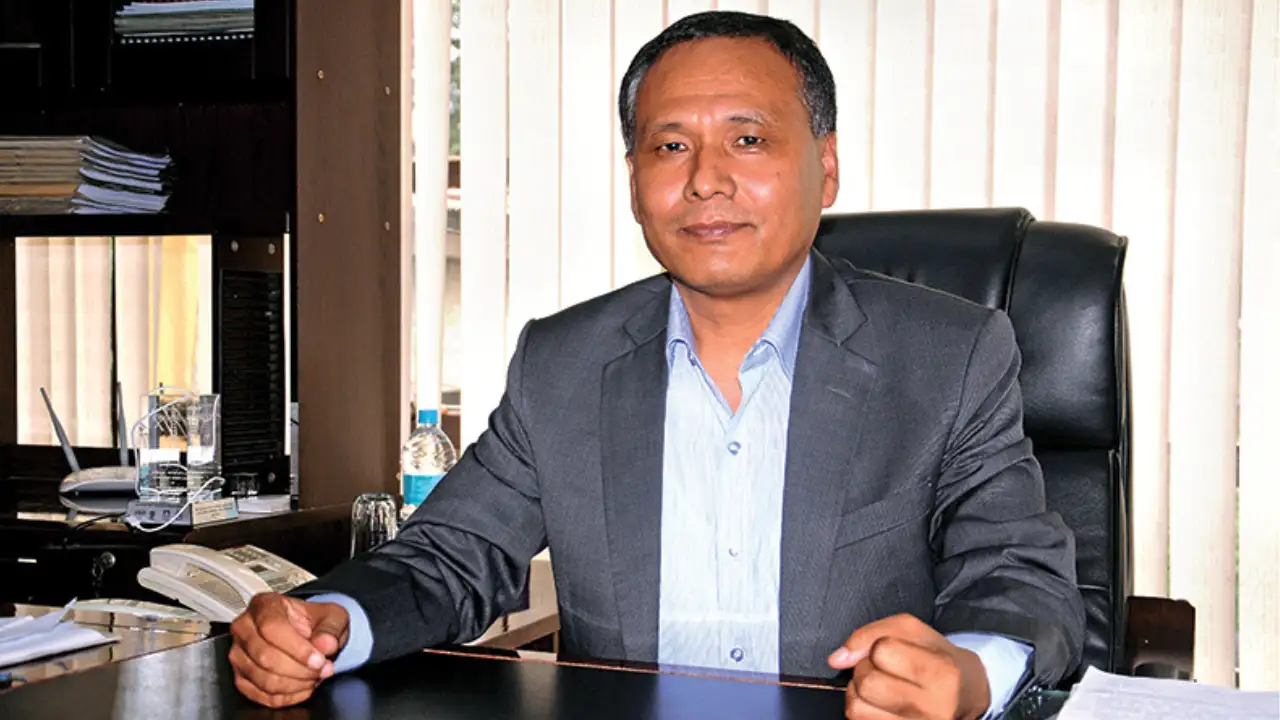By Tribune Online
Copyright tribuneonlineng

By Sani K. Usman
NO nation is stronger than the families that hold it together. When the home collapses, the nation trembles. Where the family stands firm, society finds its strength; but where it falters, insecurity creeps in and takes root. It is therefore with profound gratitude and a deep sense of honour and humility that I address this distinguished gathering, students of Senior Staff Course 47/2024 and the participants of Exercise HASKE BIYU 2025, drawn from the military, police and security agencies, academia, the media, civil society, trade and professional organisations, ministries, departments and agencies at both federal and state levels. Your presence here reflects the level of commitment to safeguarding Nigeria and fortifying its most vital foundations by this College and your respective organisations.
But before proceeding further, please allow me to sincerely appreciate our host, the Commandant of this prestigious Armed Forces Command and Staff College (AFCSC), Nigeria, Air Vice Marshal HI Alhaji, the Deputy Commandant/Director of Studies, the esteemed faculty members and the sponsors of this exercise for the kind invitation and the privilege to deliver this lecture. The expansion of this year’s Exercise HASKE BIYU to interrogate the nexus between family stability and national security is nothing short of visionary. It recognises a powerful truth: our nation’s security cannot rest on military might alone. As the National Security Strategy (2019) reminds us, Nigeria must employ “all elements of national power — political, economic, military, social and information —to ensure physical and human security and resilience.”
This strategic posture is firmly rooted in our Constitution. Section 37 of the 1999 Constitution of the Federal Republic of Nigeria (as amended) clearly states that “the privacy of citizens, their homes, correspondence, telephone conversations and telegraphic communications is hereby guaranteed and protected.” This provision highlights the centrality of the home and the family as vital pillars of our national security framework (1999 Constitution). Furthermore, the Terrorism (Prevention) Act (2011, as amended 2013) draws our attention to the dangers of information misuse by terrorist organisations. It provides for the exchange of intelligence and highlights the use of “communication technologies by terrorist groups” as a core security concern. This reinforces why linking information operations with family resilience is not only timely but strategic.
This is why the theme, “Family and National Security: Exploring the Nexus Between Family Stability, Youth Vulnerability and the Influence on Nigeria’s Internal Security Architecture,” is both timely and profound. I dare say, it is not merely a subject for reflection; it is a clarion call, a beacon of foresight guiding us toward a safer and more resilient Nigeria.
Radicalism and violent extremism, as we know, cannot be defeated by the force of arms alone. They are ultimately subdued by the power of ideas, the resilience of families and the strength of a united society. Yet, these are precisely what extremists seek to undermine, preying on fractured homes, exploiting vulnerable youths and manipulating the unregulated spaces of the information landscape. By linking information operations with family security, this year’s Exercise adopts a holistic and forward-looking approach, recognising that the fights against security challenges are won not only on the battlefield, but also in the hearts, minds and homes of our people.
By expanding this exercise to focus on family and national security, the AFCSC is demonstrating a strategic foresight that is both commendable and critical for the future. Exercise HASKE BIYU 2025, therefore, offers us a rare and timely opportunity to refine our strategies, to integrate kinetic and non-kinetic instruments such as strategic communication, enhanced social cohesion and family resilience into our national security framework (Alhaji, 2025). Against this backdrop, my presentation will provide both conceptual insights and practical strategies for harnessing the synergy between information operations and family security and for deploying them effectively to counter radicalism and protect the stability of our nation.
Violent extremist groups, such as terrorist groups, exploit information environments to spread propaganda, recruit and undermine state legitimacy. They weaponise social media, community grievances and distorted religious beliefs and narratives. Boko Haram and ISIS, for instance, weaponise narratives of victimhood and distorted religious teachings to lure vulnerable, ignorant and often unsuspecting individuals into their fold (Weimann, 2016). Therefore, IO is the antidote, enabling institutions and the state to expose lies, amplify credible voices and protect the information space.When effectively applied, IO counters these threats by projecting credible narratives, exposing adversary disinformation and protecting vulnerable populations.
Radicalism, the digital age and the role of information operations
Radicalism is not a new phenomenon. Long before the advent of the digital age, extremist ideologies spread through words of mouth, religious sermons, clandestine meetings, cassette tapes, pamphlets and print publications. Recruitment often relied on physical contact, tightly knit networks and the manipulation of local grievances within communities. While these methods were limited in scope and speed, they nevertheless proved effective in sowing division, mobilising followers, and challenging established authority (Brandeis University Special Collections, 2025; RAND, 2023). With the advancement in information and communication technology and the emergence of the digital age, radicalism has acquired unprecedented reach and sophistication.
In a world where crimes and extremist propaganda respect no borders, digital technologies have globalised the threat landscape. Violent extremist groups such as Boko Haram, Indigenous People of Biafra (IPOB), Al-Qaeda, Islamic State of Iraq and Syria (ISIS) and others, now exploit social media, encrypted messaging and online platforms to radicalise and mobilise followers across continents, sometimes in real time (UNOCT, 2021). According to Usman (2023), these entities operate with varying degrees of sophistication, often exploiting socioeconomic disparities, ethnic tensions, political grievances and fault lines to advance their objectives. They have become adept at PsyOps, using polished videos, memes, podcasts and targeting their digital campaigns at recruiting vulnerable youths, indoctrinating them with distorted ideologies and romanticising violence. These non-state actors also exploit socio-economic grievances, political corruption and perceived injustices to fan resentment, creating a fertile ground for extremism (Babalola, 2025).
In this context, Information operation (IO) stands out as a decisive tool in countering radicalism, thus safeguarding our family and national security. It is important to state that IO is not merely about countering propaganda with counter-propaganda; it is about shaping an information environment that is resilient against extremist narratives. First, IO contributes to counter-narrative development, crafting culturally sensitive and authentic messages that expose the emptiness of extremist promises while offering positive and inclusive alternatives. However, these counter-narratives must be delivered through social media campaigns, podcasts, radio broadcasts in local languages and school-based media literacy programmes, amongst others.
Secondly, IO should support psycho-social interventions, aligning with programmes that address root causes of radicalism such as unemployment, marginalisation, poverty, injustice and educational deficits, factors that extremists often exploit (Schmid, 2013). This can be achieved through community dialogues, interactive youth and stakeholders’ engagement and partnerships with civil society organisations. Thirdly, IO strengthens cyber defence and digital resilience, disrupting extremist online networks, dismantling their recruitment pipelines and protecting the information space from manipulation, an effort made possible through collaboration with technology companies (telcos), cybersecurity experts and global intelligence partners.
Thus, the fight against radicalism in the digital era cannot be won by force of arms alone. It requires a proactive, multi-layered approach in which information operations work hand in hand with families, media, communities and institutions to undermine extremist ideologies, empower vulnerable populations and secure the hearts and minds of our citizens (Zeiger&Gyte, 2023).
The role of family in countering radicalism
The family remains the first line of defence in our national security architecture, yet it is often the most overlooked. Radicalisation often takes root in homes, peer groups, or communities where supervision is weak and vulnerabilities are left unaddressed (El-Said, 2012). Strengthening the family unit is therefore not just a social imperative, but a national security priority. A stable and resilient family provides several critical safeguards, beginning with material, financial, emotional and psychological stability, which creates a protective buffer against the disillusionment, alienation, or frustration that extremist and radical ideologies exploit. It is in this regard that the National Security Strategy (2019) notes that “family cohesion and community resilience are indispensable to national stability,” highlighting the family’s strategic role in prevention and mitigating such threats.
Equally important, the family is the primary place where values, morals and identity are shaped. When these foundations are strong, children and young people are far less vulnerable to extremist narratives that prey on feelings of emptiness, isolation, or marginalisation. Therefore, in today’s digital age, families must also assume the role of digital gatekeepers. Parents and guardians who are digitally literate can guide children responsibly through cyberspace while detecting early warning signs of radicalisation both online and offline (Ogheneakoke, 2014). In this way, the family’s role extends far beyond the home; it becomes the first firewall against the spread of radical ideas and violent extremism.
However, families cannot succeed in isolation. The true strength of this lecture’s theme lies in recognising the nexus, the bridge between family resilience, community support and institutional action. IO cannot succeed without strong social foundations, just as families need reinforcement from broader structures. Security agencies, schools, other institutions, faith-based organisations, and civil society must therefore work deliberately with families, ensuring that their preventive role is backed by systemic and institutional support. Indeed, the Terrorism Prevention (Amendment) Act (2013) stresses that counter-terrorism measures must also involve “community-based efforts” and cooperation between state institutions and citizens, pointing to the indispensable role of the family within this wider ecosystem.
This collaboration requires practical action. It means empowering families with educational resources and support systems to identify the signs of radicalisation and respond at its earliest stages. It also means strengthening community ties through IO-driven campaigns that promote inclusion, a sense of belonging and positive engagement of the youths, thereby reducing the appeal of radical and extremist ideologies. It also requires embedding IO into civil-military operations, where communication specialists work alongside security agencies to deliver holistic solutions that combine enforcement with socio-economic development and credible messaging. When families are resilient, communities are cohesive, and institutions are responsive, the cycle of radicalisation and extremism can be broken before it begins.
In this sense, the family is not just a private unit but a strategic asset in Nigeria’s collective fight against radicalism and violent extremism. And let us remember: when the family stands firm, radicalism will find no foothold; when families falter, our entire security architecture is weakened at its core.I believe this is precisely why the AFCSC, through visionary exercises such as HASKE BIYU, plays a vital role in operationalising these national directives by training leaders like you, the participants, to integrate family resilience, community engagement and information operations into Nigeria’s broader security strategy.
Information operations targeting families
Information managers across government agencies, civil society and the media must always be mindful of the family’s strategic role. Messages should consistently exhort and remind families of their responsibility in combating radicalisation. In this way, IO not only protect communities but also reinforces the family as the first line of national defence. While IO plays a broad role in shaping narratives and countering extremist propaganda, there is a compelling need to deliberately focus these operations on the family unit. Families remain the nucleus of any society and are strategically placed to detect, resist, and reverse radicalisation at its earliest stage. Any IO targeting families should therefore be sustained, deliberate and culturally sensitive. Their core objectives are to:
a. Raise awareness by educating families about the signs and risks of radicalisation.
b. Build resilience by strengthening family bonds, values and critical thinking to resist extremist narratives.
c. Provide support by offering resources and guidance to families dealing with radicalisation.
It is important to note that such initiatives can be operationalised through:
a. Workshops and training programmes that equip families with practical skills to identify radicalisation and nurture resilience.
b. Community outreach campaigns designed to foster trust, social cohesion, and collaborative prevention strategies.
c. Digital and online resources offering accessible information, counselling support, and helplines for at-risk families.
By making the family a focal point of IO, security agencies and stakeholders can create an enduring firewall against radicalisation, one that neutralises extremist influence before it takes root in the minds of our vulnerable youths.
Frameworks for civil-military, policy and community collaboration
Counter-radicalisation cannot be achieved by the military, security agencies, or the government alone; it is a collective national responsibility. Therefore, sustainable counter-radicalism measures require a framework that integrates civil-military collaboration with coherent policy direction, institutional support and community engagement. Collaboration with civil society organisations, schools, media institutions, religious bodies and the private sector could expand the reach and legitimacy of IO campaigns, ensuring that no single entity works in isolation, thus achieving the desired success. Moreso, the media mobilises and aggregates public opinion, which in turn influences governments, persons and business organisations’ policy formulation and decisions. It also enhances social interaction and integration (Usman, 2023). Therefore, effective synergy among these not only prevents duplication of efforts but also guarantees that families and communities receive consistent, credible and sustained support (Bartlett & Miller, 2012).
At the policy level, frameworks such as the National Counter-Terrorism Strategy (NACTEST) provide strategic direction by promoting prevention, protection and partnership as central pillars of counter-radicalisation. As NACTEST (2016) clearly states, Nigeria’s approach to counter-terrorism must be a “whole-of-government and whole-of-society approach, anchored on the principles of cooperation, coordination and collective responsibility.”Therefore, institutions must also play their part by integrating counter-radicalisation and extremism modules into school curricula, strengthening community policing and embedding IO into broader security and development policies.
Equally important is the community dimension. Families must be empowered socially and economically to reduce vulnerabilities that radicals and extremist recruiters exploit. At the same time, leaders at all levels, media,and civil society organisations must serve as frontline partners in building trust, disseminating credible narratives, and fostering family and community resilience against radical and extremist ideas. Community-based resilience ensures that counter-radicalisation efforts are not only reactive but preventative, addressing the root causes that extremists prey upon.
Ultimately, success lies in multi-level engagement, policy-driven, institutionally supported, civil-military integrated and community-rooted countermeasures against radicalism and extremism in our societies. When these dimensions align, they create a comprehensive architecture of resilience that addresses both the ideological and socio-economic drivers of radicalisation. This alignment transforms counter-radicalisation from a fragmented effort into a coordinated national strategy, ensuring that every sector of society contributes meaningfully to securing Nigeria’s stability and future.
Recommendations
It is recommended that:
a. The Federal Government of Nigeria should establish a national counter-radicalisation unit focused on developing and executing strategic information operations to counter extremist narratives, to be domiciled at the Office of the National Security Adviser.
b. The Ministry of Defence should foster public-private partnerships with telcos, media and NGOs to leverage their capability and expertise in data analytics and social media monitoring to create a comprehensive response to radicalism and extremism in Nigeria.
c. The Ministry of Information and National Orientation should launch and sustain a nationwide, multimedia campaign to educate families on the dangers of online radicalisation and extremism and provide practical tips for building digital resilience.
d. The AFCSC should continue to integrate modules on IO and family security and their links to national security into its curriculum for the senior command and staff course.
e. Security agencies, in collaboration with the Ministry of Women Affairs and the Ministry of Information and National Orientation, should design family-focused IO campaigns. These should include community workshops, family counselling resources, and digital media platforms dedicated to educating and empowering families against radicalisation.
The threat of radicalisation and extremism in the digital age is a direct challenge to our internal security, but it is one we can overcome. The answer lies in a holistic strategy that unites the power of information operations with the foundational strength of the family unit. Information shapes perceptions, while families shape values and resilience. When synchronised, they form a powerful shield against extremist ideologies. This is why this presentation has meticulously explored conceptual clarifications; the nexus between Information Operations and radicalism; the influence of the digital age; the critical role of the family; and the frameworks for civil-military, policy, and community collaboration, while offering actionable recommendations. You, as participants of Exercise HASKE BIYU, 2025 are challenged to integrate these lessons into your future planning and operations, combining kinetic efforts with non-kinetic strategies that strengthen our people, protect our families, and preserve our national unity.
•Brig Gen. S. K. Usman (retd) delivered this lecture at the Armed Forces Command and Staff College, Jaji



